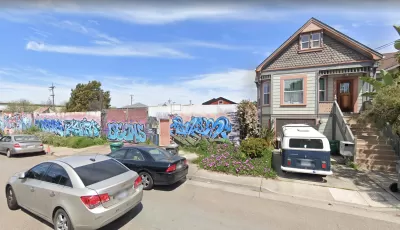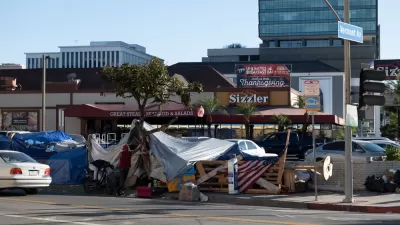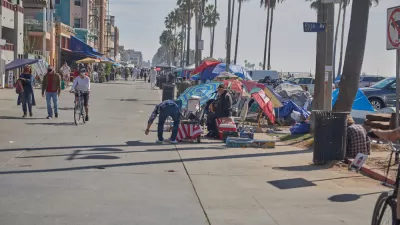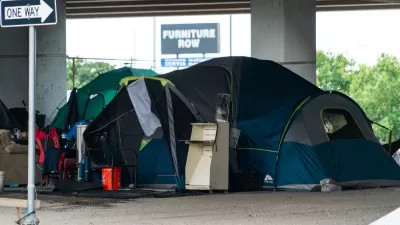A controversy over the unpermitted use of RVs for shelter on an otherwise empty lot in West Oakland reveals a confluence of Bay Area housing crises.

"RVs have become a hot-button issue in cities throughout the Bay Area as residents priced out of the traditional housing and rental markets increasingly are moving into homes on wheels," reports Marissa Kendall.
"In Palo Alto, RVs parked next to the Stanford campus get regular tow warnings, prompting them to move down the road and back. Pacifica is fighting a lawsuit after making certain city streets off-limits to RV parking. Richmond attempted to create a sanctioned safe-parking site for RVs, but abandoned the idea last month after community pushback."
The article focuses on the human interests behind a recent effort by the city of Oakland to disband the half-dozen or so people living in RVs on a vacant lot in West Oakland, one of a "very few places in the region where someone can legally park a trailer or RV," according to Kendall. "The bohemian space looks like a cross between a trailer park and a cheerful community garden," writes Kendall. One of the residents of the lot tells Kendall that the owner is renting lot to him for $1,600 a month, including a "lease that lists the official purpose as “storage” for RVs and vehicles," and residents pay $600 a month to keep their RVs there.
The city of Oakland is trying to shut down the lot, reports Kendall, citing code enforcement as its legal means. Violations include "unapproved use of an RV as a sleeping quarters, storage of vehicles and RVs, and an unpermitted fence and shower." The city has placed a lien on the property and is piling up fines, totaling $5,610 as of Kendall's writing. All of those financial and legal troubles will be waived if the residents on the lot are displaced.
The source article below includes more detail on the city of Oakland's blight laws and homeless policies, as well as the human interest stories that can be found in the lot.
FULL STORY: Oakland: Why the city may shut down this unusual housing solution

Planetizen Federal Action Tracker
A weekly monitor of how Trump’s orders and actions are impacting planners and planning in America.

Maui's Vacation Rental Debate Turns Ugly
Verbal attacks, misinformation campaigns and fistfights plague a high-stakes debate to convert thousands of vacation rentals into long-term housing.

Cuomo Is the Candidate of Both NIMBYs and Developers. What Gives?
In the New York City mayoral race, odd bedfellows align to preserve the housing status quo.

Amtrak Rolls Out New Orleans to Alabama “Mardi Gras” Train
The new service will operate morning and evening departures between Mobile and New Orleans.

The Subversive Car-Free Guide to Trump's Great American Road Trip
Car-free ways to access Chicagoland’s best tourist attractions.

San Antonio and Austin are Fusing Into one Massive Megaregion
The region spanning the two central Texas cities is growing fast, posing challenges for local infrastructure and water supplies.
Urban Design for Planners 1: Software Tools
This six-course series explores essential urban design concepts using open source software and equips planners with the tools they need to participate fully in the urban design process.
Planning for Universal Design
Learn the tools for implementing Universal Design in planning regulations.
Heyer Gruel & Associates PA
JM Goldson LLC
Custer County Colorado
City of Camden Redevelopment Agency
City of Astoria
Transportation Research & Education Center (TREC) at Portland State University
Jefferson Parish Government
Camden Redevelopment Agency
City of Claremont





























